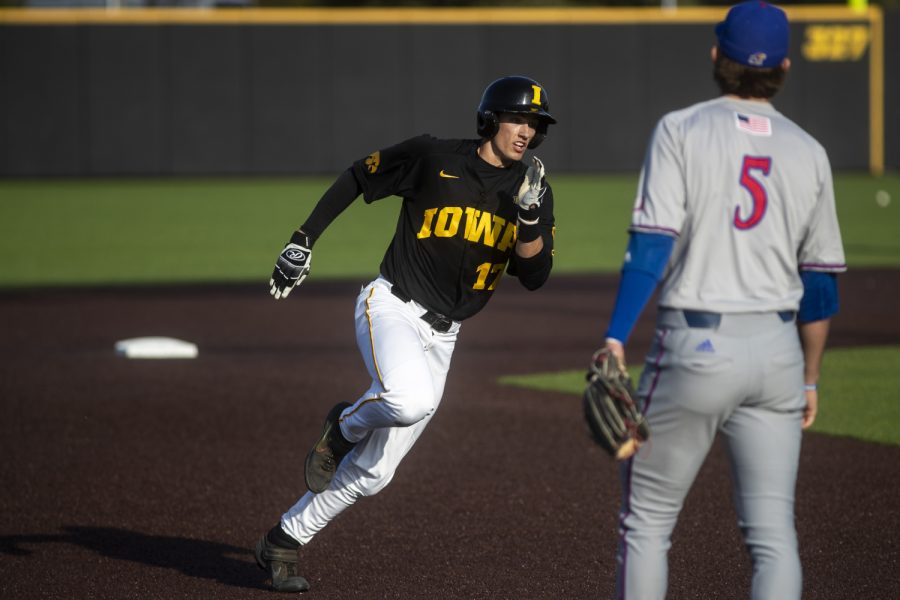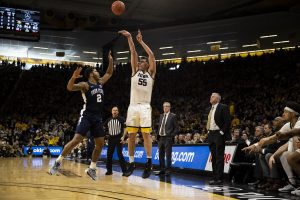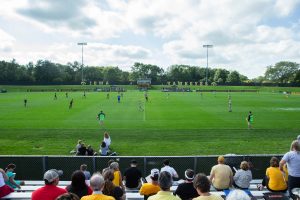Hawkeyes find success in unique college summer league baseball season
The COVID-19 pandemic has shut down some summer leagues across the country, however, some leagues are still giving players the opportunity to compete this summer.
Iowa infielder Dylan Nedved rounds the bases during a baseball game between the Iowa Hawkeyes and the Kansas Jayhawks on Tuesday, March 10, at Duane Banks Field. The Hawkeyes defeated the Jayhawks, 8-0.
July 30, 2020
Another summer means another year of collegiate summer league baseball, and while this summer is not like any other due to the COVID-19 pandemic, Iowa baseball players are still spread out across the country for summer league play.
The Northwoods league, which includes seven divisions of teams from seven different states, has the most Hawkeye players competing in it this summer. The league has 11 Iowa players competing for the seven different teams.
Other notable leagues that the Hawkeyes are competing in currently include the Midwest Collegiate League and the Sunflower Collegiate League.
“One of the best ways of getting better is obviously just playing the game,” senior outfielder Ben Norman said. “The more that you can play, the more at-bats you can see, the more defensive reps you can get, and the more you can get into the mental side of baseball in a game atmosphere.”
During a typical summer, most college baseball players would sign up for a summer collegiate league toward the end of the fall, and then those coaches would help the players get settled with a team and living arrangements.
With the COVID-19 pandemic affecting different parts of the country more than others, many summer leagues were forced to shut down for the year leaving players with unique experiences in their efforts to get on the field in the summer.
“I did not plan to play anywhere, but [Iowa Director of Player Development Tom] Gorzelanny actually knew the coach that I am playing for right now with St. Cloud Rox,” Norman said. “Somehow they got me hooked up to come up here, so I’ve been playing in St. Cloud [Minnesota].”
Other Hawkeyes could not play in the league they were originally signed up for and had to find alternative opportunities.
“I talked to Iowa head coach Rick [Heller] at the beginning of the fall season last year, and I had a place I wanted to go but it was not available,” said junior two-way player Dylan Nedved. “I just decided to come back to where I had always been in the Sunflower League.”
RELATED: Baseball coach Rick Heller explains impact of NCAA’s blanket waiver on Iowa for 2021 season
Nedved is in the middle of a breakout summer for the Hutchinson Monarchs of the Sunflower Collegiate League in Kansas. After 30 games played, he has the most hits in the league (46), the 12th highest batting average (.371), and he was named MVP of the Sunflower Collegiate League All-Star game.
“I have just been feeling really good at the plate and taking it one game at a time,” Nedved said. “I am not trying to do too much, but I am just focusing hard on every at-bat and trying to win every pitch.”
Sophomore right-hander Jack Guzek was another Hawkeye with a standout performance this summer when he earned Midwest Collegiate League Pitcher of the Week after striking out nine batters through six innings of work for the Northwest Indiana Oilmen two weeks ago.
Collegiate summer ball gives players the opportunity to travel to different parts of the country and play professional style schedules. Many of these ballplayers competing in different states and within their own stay with host families for the summer in order to make it to the ballpark every day.
“In my situation, once you get assigned to the team, you fill out a questionnaire about what your lifestyle habits are, what you like to eat, things like that,” Norman said. “Then they try to pair you up with a family that is similar to what you wrote down.”
The COVID-19 pandemic has not stopped summer baseball and has even increased the level of competition as top college players who would have otherwise played in notable canceled leagues, such as the Cape Cod league, are now spread out among the smaller number of teams.
While baseball is continuing, concerns for player safety and virus spread have not gone away.
“This year the Northwoods is very good because there are not very many other leagues going on,” Norman said. “We are really only going to our host families’ houses, going to lift, and then going to the field, and I feel like the only people we really see are each other which I think keeps it safer.”






